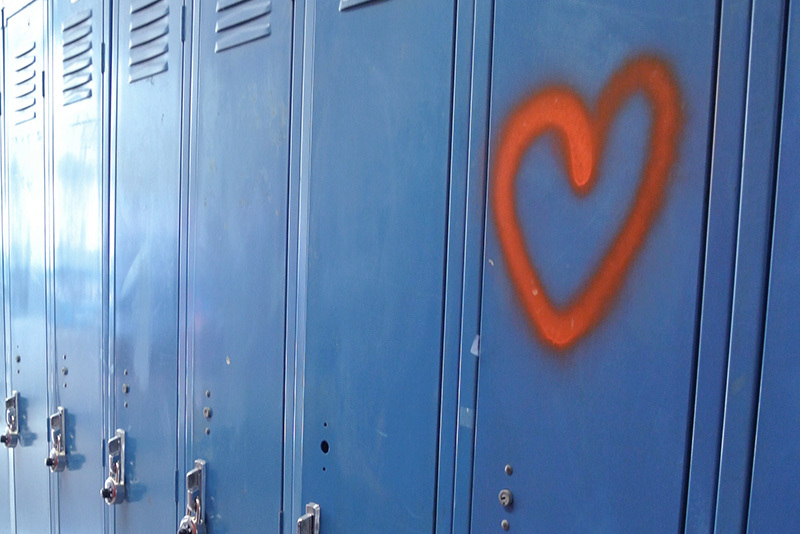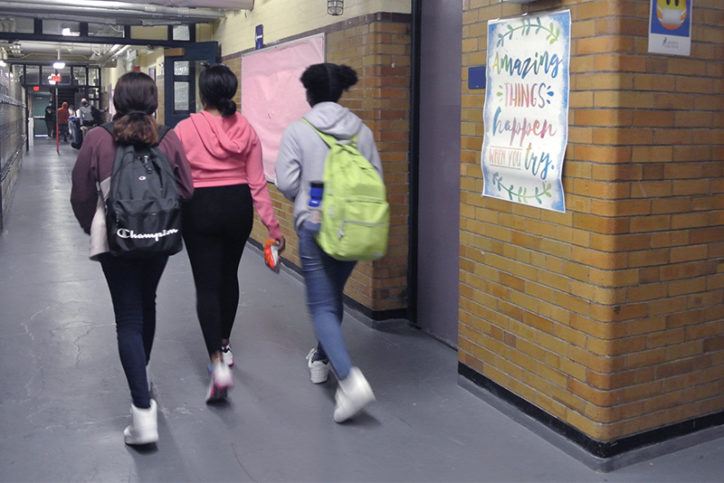Care in the classroom: Children’s behavioral health in schools

If you want to address children’s social, emotional, and behavioral health, go to where the kids are — in schools.
This straightforward idea is at the heart of the Boston Children’s Hospital Neighborhood Partnerships (BCHNP). The program and its team of 17 psychologists and social workers bring behavioral health services and training directly to schools, a setting where kids spend a large part of their days.
For the past 20 years, BCHNP, part of Boston Children’s Department of Psychiatry and Behavioral Sciences, has been partnering with the Boston Public Schools on many levels to increase access to services. At the individual school level, the program currently provides direct care within five Boston schools. On a broader level, BCHNP has provided training and consultation to 25 Boston schools over the past six years. And even more broadly, BCHNP collaborates with the Boston Public School system to support a number of social, emotional, and behavioral health initiatives throughout district.
“People often ask me why Boston Children’s is working on-site in schools,” says Dr. Shella Dennery, director of the BCHNP program. “Schools are uniquely positioned to ensure students receive health care services. Given the current behavioral health crisis and gaps in care, we need to be intentional about how and where we create access to services, especially for youth of color and urban youth who are least likely to receive care in traditional care settings.”
Children’s behavioral health takes place in communities
School-age children are more likely to receive social, emotional, and behavioral health services at school than anywhere else. School-based programs increase access by teaching skills like emotion regulation and self-awareness. They can also foster a positive learning environment.
When students participate in conversations about emotional health and well-being with their peers, they often gain a greater sense of belonging. Such conversations help normalize behavioral health, says Dr. Dennery. Rather than being perceived as weakness, “behavioral health becomes a shared experience — a strength — and something that we all have.”

To these ends, classroom-based social and emotional learning is an important aspect of BCHNP’s comprehensive, tiered approach. As one student put it, “…we all share similar thoughts, feelings, and struggles and so just talking about it with each other and giving each other advice has been really helpful.”
A safety net of care
The ratio of students to school-based behavioral health specialists in Massachusetts falls far below national recommendations, according to a 2020 report by the Behavioral Health Integrated Resources for Children Project.
Over the past two years, Boston Public Schools have hired more social workers and psychologists. But it will take time for the district of 121 schools to plan and implement behavioral health systems and programming for their almost 49,000 students.
And the increase in school-based positions is not enough to meet students’ needs, says Dr. Dennery. “It’s an important investment. But it’s only foundational given the needs of youth and schools today.” Thus, increasing the capacity of schools to address students’ behavioral health needs is essential. The partnership between BCHNP and Boston Public Schools is leading the way to ensure that a safety net of care is in place.
To help students, help the adults in their lives
“For many families, schools are the only point of contact for services and supports,” says Dr. Dennery. “The health care system is incredibly challenging to navigate, and when caregivers need support and guidance, they often turn to the school for help.”
“This is an incredible time of opportunity. I’m encouraged by the possibilities of reimagining a new model of care that centers on schools as a hub of services and support to better meet the needs of all youth.”
Given that, and all that youth are bringing into the classroom today, the adults surrounding them need support. However, “many teachers have told us that they have limited training when it comes to behavioral health,” says Dennery. BCHNP therefore works with and listens closely to educators. The program provides free, high-quality training for school communities to help build resilience and keep teachers in the field.
For instance, the Training and Access Project (TAP) provides professional development for school staff and consultation to help schools create effective systems. TAP also has created an online training series on social, emotional and behavioral health for educators nationwide. Not only are these resources good for students, they’re good for educators — those who are navigating the social, emotional and behavioral health of youth on a daily basis.
In a recent evaluation of BCHNP professional development workshops, teachers reported significant increases in their knowledge, skills, and self-efficacy in addressing their students’ social, emotional, and behavioral health needs. Participants also said they felt confident implementing the strategies learned in the workshops.
A new model of care
When Dr. Dennery looks at the state of children’s behavioral health, she sees reasons for hope. “This is an incredible time of opportunity. I’m encouraged by the possibilities of reimagining a new model of care that centers on schools as a hub of services and support to better meet the needs of all youth.”
Partnerships between schools and hospitals like BCHNP are a promising part of the of this new model.
Online tools for educators
BCHNP is proud to have created a series of trainings, webinars, and podcasts specifically designed for educators and school communities. The following resources are free for school communities anywhere.
Training Access Project Online, free online training series to help educators understand behavioral health, how to support students, and how to identify and manage crises.
Views of Resilience, a podcast series in which educators and families share the ways they have demonstrated strength and care for one another during the pandemic and how they are moving forward.
Understanding Anxiety in Schools, a webinar for families and school staff.
Learn more about Boston Children’s Hospital Neighborhood Partnerships.
Related Posts :
-

Help your child manage anxiety about school violence
With news of school shootings and other violence often reaching children, parents sometimes grapple with how to help their child ...
-

Diversity and inclusion: Lessons from the field
Having led workplace diversity and inclusion work for more than a decade, Rich Robles witnessed a dramatic shift in the ...
-

Teens, anxiety, and depression: How worried should parents be?
Part of the work of being a teenager is making connections outside of the family and becoming attuned to world ...
-

Talking with – not at – young people about substance use
Teens and young adults using drugs and alcohol is not new. Neither is the challenge of speaking with them about ...





